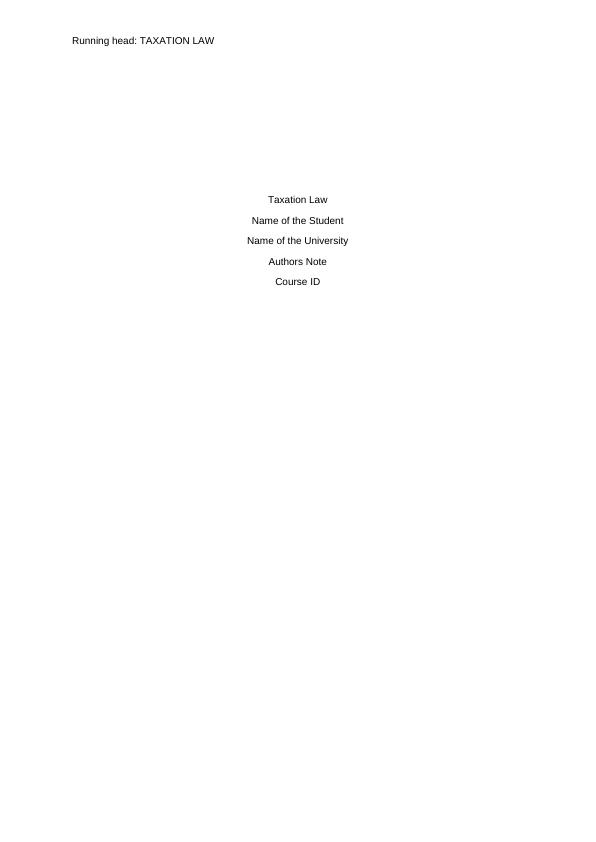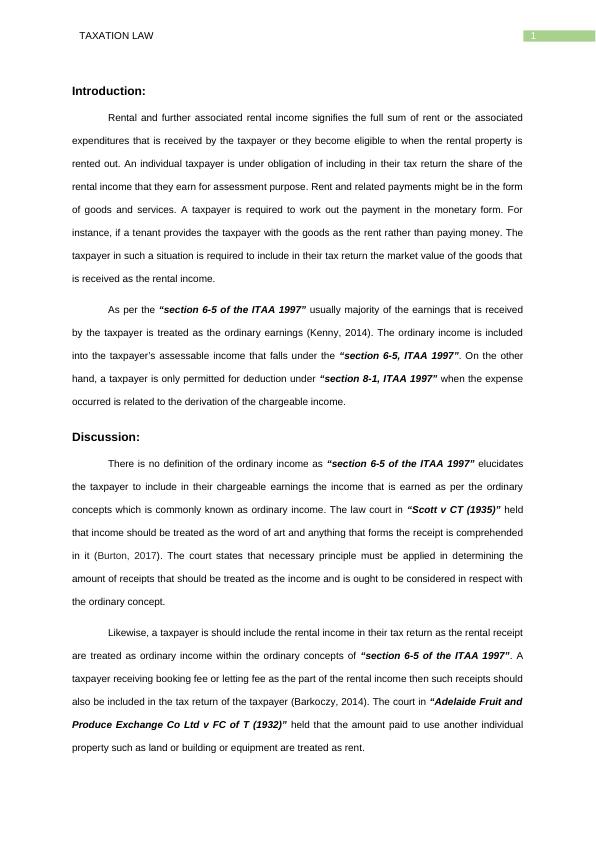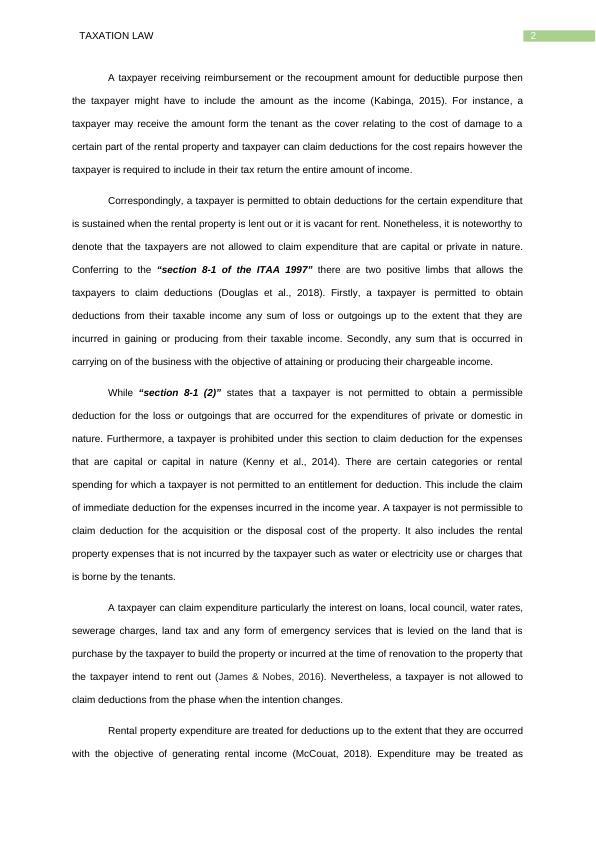Taxation Law
Added on 2023-06-04
8 Pages2506 Words216 Views
Running head: TAXATION LAW
Taxation Law
Name of the Student
Name of the University
Authors Note
Course ID
Taxation Law
Name of the Student
Name of the University
Authors Note
Course ID

1TAXATION LAW
Introduction:
Rental and further associated rental income signifies the full sum of rent or the associated
expenditures that is received by the taxpayer or they become eligible to when the rental property is
rented out. An individual taxpayer is under obligation of including in their tax return the share of the
rental income that they earn for assessment purpose. Rent and related payments might be in the form
of goods and services. A taxpayer is required to work out the payment in the monetary form. For
instance, if a tenant provides the taxpayer with the goods as the rent rather than paying money. The
taxpayer in such a situation is required to include in their tax return the market value of the goods that
is received as the rental income.
As per the “section 6-5 of the ITAA 1997” usually majority of the earnings that is received
by the taxpayer is treated as the ordinary earnings (Kenny, 2014). The ordinary income is included
into the taxpayer’s assessable income that falls under the “section 6-5, ITAA 1997”. On the other
hand, a taxpayer is only permitted for deduction under “section 8-1, ITAA 1997” when the expense
occurred is related to the derivation of the chargeable income.
Discussion:
There is no definition of the ordinary income as “section 6-5 of the ITAA 1997” elucidates
the taxpayer to include in their chargeable earnings the income that is earned as per the ordinary
concepts which is commonly known as ordinary income. The law court in “Scott v CT (1935)” held
that income should be treated as the word of art and anything that forms the receipt is comprehended
in it (Burton, 2017). The court states that necessary principle must be applied in determining the
amount of receipts that should be treated as the income and is ought to be considered in respect with
the ordinary concept.
Likewise, a taxpayer is should include the rental income in their tax return as the rental receipt
are treated as ordinary income within the ordinary concepts of “section 6-5 of the ITAA 1997”. A
taxpayer receiving booking fee or letting fee as the part of the rental income then such receipts should
also be included in the tax return of the taxpayer (Barkoczy, 2014). The court in “Adelaide Fruit and
Produce Exchange Co Ltd v FC of T (1932)” held that the amount paid to use another individual
property such as land or building or equipment are treated as rent.
Introduction:
Rental and further associated rental income signifies the full sum of rent or the associated
expenditures that is received by the taxpayer or they become eligible to when the rental property is
rented out. An individual taxpayer is under obligation of including in their tax return the share of the
rental income that they earn for assessment purpose. Rent and related payments might be in the form
of goods and services. A taxpayer is required to work out the payment in the monetary form. For
instance, if a tenant provides the taxpayer with the goods as the rent rather than paying money. The
taxpayer in such a situation is required to include in their tax return the market value of the goods that
is received as the rental income.
As per the “section 6-5 of the ITAA 1997” usually majority of the earnings that is received
by the taxpayer is treated as the ordinary earnings (Kenny, 2014). The ordinary income is included
into the taxpayer’s assessable income that falls under the “section 6-5, ITAA 1997”. On the other
hand, a taxpayer is only permitted for deduction under “section 8-1, ITAA 1997” when the expense
occurred is related to the derivation of the chargeable income.
Discussion:
There is no definition of the ordinary income as “section 6-5 of the ITAA 1997” elucidates
the taxpayer to include in their chargeable earnings the income that is earned as per the ordinary
concepts which is commonly known as ordinary income. The law court in “Scott v CT (1935)” held
that income should be treated as the word of art and anything that forms the receipt is comprehended
in it (Burton, 2017). The court states that necessary principle must be applied in determining the
amount of receipts that should be treated as the income and is ought to be considered in respect with
the ordinary concept.
Likewise, a taxpayer is should include the rental income in their tax return as the rental receipt
are treated as ordinary income within the ordinary concepts of “section 6-5 of the ITAA 1997”. A
taxpayer receiving booking fee or letting fee as the part of the rental income then such receipts should
also be included in the tax return of the taxpayer (Barkoczy, 2014). The court in “Adelaide Fruit and
Produce Exchange Co Ltd v FC of T (1932)” held that the amount paid to use another individual
property such as land or building or equipment are treated as rent.

2TAXATION LAW
A taxpayer receiving reimbursement or the recoupment amount for deductible purpose then
the taxpayer might have to include the amount as the income (Kabinga, 2015). For instance, a
taxpayer may receive the amount form the tenant as the cover relating to the cost of damage to a
certain part of the rental property and taxpayer can claim deductions for the cost repairs however the
taxpayer is required to include in their tax return the entire amount of income.
Correspondingly, a taxpayer is permitted to obtain deductions for the certain expenditure that
is sustained when the rental property is lent out or it is vacant for rent. Nonetheless, it is noteworthy to
denote that the taxpayers are not allowed to claim expenditure that are capital or private in nature.
Conferring to the “section 8-1 of the ITAA 1997” there are two positive limbs that allows the
taxpayers to claim deductions (Douglas et al., 2018). Firstly, a taxpayer is permitted to obtain
deductions from their taxable income any sum of loss or outgoings up to the extent that they are
incurred in gaining or producing from their taxable income. Secondly, any sum that is occurred in
carrying on of the business with the objective of attaining or producing their chargeable income.
While “section 8-1 (2)” states that a taxpayer is not permitted to obtain a permissible
deduction for the loss or outgoings that are occurred for the expenditures of private or domestic in
nature. Furthermore, a taxpayer is prohibited under this section to claim deduction for the expenses
that are capital or capital in nature (Kenny et al., 2014). There are certain categories or rental
spending for which a taxpayer is not permitted to an entitlement for deduction. This include the claim
of immediate deduction for the expenses incurred in the income year. A taxpayer is not permissible to
claim deduction for the acquisition or the disposal cost of the property. It also includes the rental
property expenses that is not incurred by the taxpayer such as water or electricity use or charges that
is borne by the tenants.
A taxpayer can claim expenditure particularly the interest on loans, local council, water rates,
sewerage charges, land tax and any form of emergency services that is levied on the land that is
purchase by the taxpayer to build the property or incurred at the time of renovation to the property that
the taxpayer intend to rent out (James & Nobes, 2016). Nevertheless, a taxpayer is not allowed to
claim deductions from the phase when the intention changes.
Rental property expenditure are treated for deductions up to the extent that they are occurred
with the objective of generating rental income (McCouat, 2018). Expenditure may be treated as
A taxpayer receiving reimbursement or the recoupment amount for deductible purpose then
the taxpayer might have to include the amount as the income (Kabinga, 2015). For instance, a
taxpayer may receive the amount form the tenant as the cover relating to the cost of damage to a
certain part of the rental property and taxpayer can claim deductions for the cost repairs however the
taxpayer is required to include in their tax return the entire amount of income.
Correspondingly, a taxpayer is permitted to obtain deductions for the certain expenditure that
is sustained when the rental property is lent out or it is vacant for rent. Nonetheless, it is noteworthy to
denote that the taxpayers are not allowed to claim expenditure that are capital or private in nature.
Conferring to the “section 8-1 of the ITAA 1997” there are two positive limbs that allows the
taxpayers to claim deductions (Douglas et al., 2018). Firstly, a taxpayer is permitted to obtain
deductions from their taxable income any sum of loss or outgoings up to the extent that they are
incurred in gaining or producing from their taxable income. Secondly, any sum that is occurred in
carrying on of the business with the objective of attaining or producing their chargeable income.
While “section 8-1 (2)” states that a taxpayer is not permitted to obtain a permissible
deduction for the loss or outgoings that are occurred for the expenditures of private or domestic in
nature. Furthermore, a taxpayer is prohibited under this section to claim deduction for the expenses
that are capital or capital in nature (Kenny et al., 2014). There are certain categories or rental
spending for which a taxpayer is not permitted to an entitlement for deduction. This include the claim
of immediate deduction for the expenses incurred in the income year. A taxpayer is not permissible to
claim deduction for the acquisition or the disposal cost of the property. It also includes the rental
property expenses that is not incurred by the taxpayer such as water or electricity use or charges that
is borne by the tenants.
A taxpayer can claim expenditure particularly the interest on loans, local council, water rates,
sewerage charges, land tax and any form of emergency services that is levied on the land that is
purchase by the taxpayer to build the property or incurred at the time of renovation to the property that
the taxpayer intend to rent out (James & Nobes, 2016). Nevertheless, a taxpayer is not allowed to
claim deductions from the phase when the intention changes.
Rental property expenditure are treated for deductions up to the extent that they are occurred
with the objective of generating rental income (McCouat, 2018). Expenditure may be treated as

End of preview
Want to access all the pages? Upload your documents or become a member.
Related Documents
Taxation Law: Rental Income and Permissible Deductionslg...
|6
|2518
|316
Taxation Lawlg...
|8
|2379
|85
Taxation Lawlg...
|7
|1938
|326
Taxation Law: Income Tax Liability and Allowable Deductionslg...
|12
|2700
|303
The receipt of salary and performance bonuslg...
|8
|1696
|21
Taxation Law: Understanding Assessable Income and Allowable Deductionslg...
|12
|2910
|181
